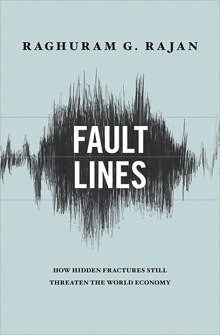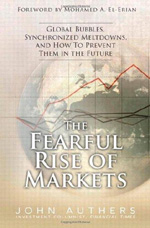August 13, 2011
Book review: Fault Lines: How Hidden Fractures Still Threaten the World Economy
 I had high hopes for this book since it was authored by someone important enough to be invited to Jackson Hole and brave enough to criticize Alan Greenspan. I was deeply disappointed.
I had high hopes for this book since it was authored by someone important enough to be invited to Jackson Hole and brave enough to criticize Alan Greenspan. I was deeply disappointed.On reading the dust cover flaps I started to have misgivings. It sounded like it might be another book prompting social engineering in the style of Joe Stiglitz's Freefall. The introduction was much better, promising lots of good information in the various chapters. But it's fluff at best.
One fault line is the supposed weak social safety net in America. To sustain his point Rajan tells us the sad story of Badri who seems to be a brilliant scientist and engineer with a handful of degrees including at least one Ph.D. and at one point a six figure salary. Badri loses his job and cannot make ends meet on the $400 a week unemployment check. This anecdote is the basis for taking more money from taxpayers to pay the "less fortunate." I suppose professor Rajan knows that government money is taxpayer money, present or future taxpayers.
If anecdotes are enough to base policy on then I'll tell the story of my cousin Attila who is a smart technician without a university degree and who only had a five figure salary, not six. He too lost his job when his company went bankrupt. But that is where the similarities between Badri and Attila end.
 Attila, while he still had a job, instead of putting his extra money in low interest savings accounts started buying dilapidated properties, fixing them up with the help of just one worker and renting them out when finished. His company was restructured in bankruptcy court and they offered to hire him back at half his previous salary. Attlia, unlike Badri, was now in the position of flipping his ex-employer a bird!
Attila, while he still had a job, instead of putting his extra money in low interest savings accounts started buying dilapidated properties, fixing them up with the help of just one worker and renting them out when finished. His company was restructured in bankruptcy court and they offered to hire him back at half his previous salary. Attlia, unlike Badri, was now in the position of flipping his ex-employer a bird!I find the idea of government financed unemployment benefits for people making six figure salaries preposterous. Who knows, maybe if Badri had studied The Three Little Piggies instead of the Kamasutra he would not have needed unemployment benefits.
A Politically Correct Writer
While reading the introduction, I discovered that, according to Rajan, all dentists in Stuttgart are female. Of course they are not but Rajan is a Politically Correct (PC) writer. Language should be used to transmit ideas. An author has the choice of writing clearly or including distracting ideological asides which is what PC writers like to do. In Chapter One, Let Them Eat Credit, all workers are female. "Let Them Eat Credit" is a terribly pun. Again, Rajan thinks he is clever but he is only distracting the reader from the message. Good journalism requires stories to have "human interest." In Chapter One Rajan introduces a fictional "Jane" which is a very poor choice of a name since Jane is easily associated with Jane Doe an unknown person often the victim of a crime. The style is childish: "Watch Jane jump. Watch Jane not get a college education. Watch Jane having problems on the job." Rajan apparently does not think about who his audience might be.I skimmed through the rest of Chapter One. By this time I was annoyed enough to put the book away. Later I decided to give it another try and came across the anecdotal Badri.

The Fearful Rise of Markets
I have tried to find out what caused the financial meltdown of 2008. I have read many sources and, frankly, the professors of economics have been the least helpful. They seem to have a social agenda axe they wish to grind. I just want the facts. I'm quite capable of drawing the conclusions myself from the facts. I don't want to be lectured, just informed.By far the best book I have read on the subject is The Fearful Rise of Markets by Financial Times columnist John Authers. He tells the story in easy to read chapters, covering the same terrain as the professors of economics but without the political baggage that so detracts from the tomes by the learned professors.
Denny Schlesinger
Fault Lines: How Hidden Fractures Still Threaten the World Economy by Raghuram G. Rajan
The Three Little Piggies A fable every professor of economics should study and teach
The Fearful Rise of Markets: Global Bubbles, Synchronized Meltdowns, and How To Prevent Them in the Future by Financial Times columnist John Authers (Author), Mohamed A. El-Erian (Foreword)
Copyright © Software Times, 2000, 2001, 2003. All rights reserved
Last updated March 8, 2009.
Last updated March 8, 2009.